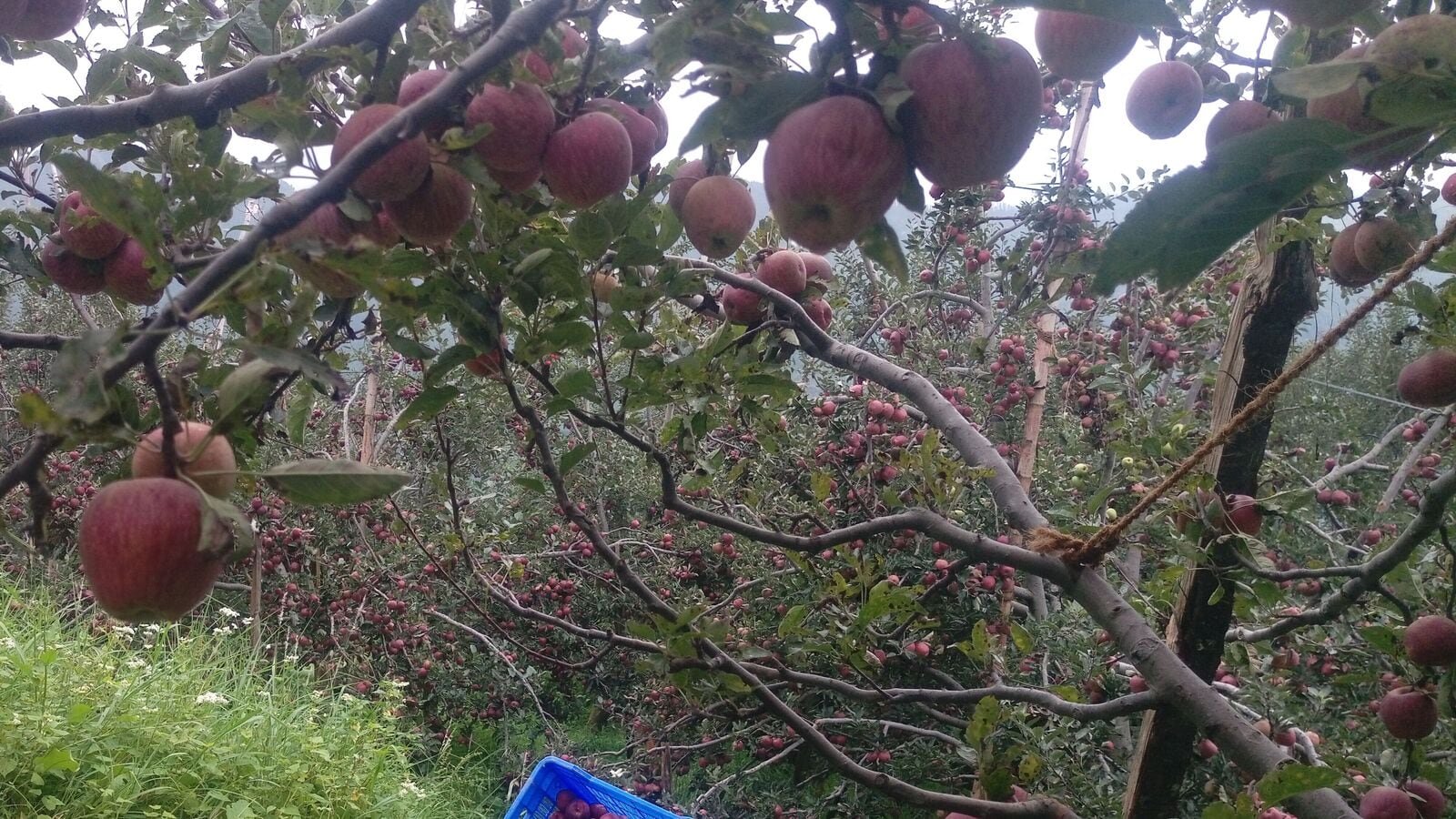Recently, several farmers from these regions held a protest against the government, demanding remunerative prices for their produce, much like other farmers protesting on the state borders of New Delhi.
The case of apple farmers is peculiar. Apple yields in India are low and the country lacks on-orchard cold storage facilities. They bear costly inputs, given how expensive fertilizers and pesticides have become, and face the constant threat of volatile prices even as climate change adds to their vulnerability.
Natural calamities such as droughts, floods, hail-storms and rising temperatures in the Himalayas complicate their prospects. Wildlife risks, particularly monkeys destroying crops, abound as well. Meanwhile, corporate presence in the apple market has risen.
Trade policies pose their own challenges. Today, Indian apple producers are caught in a web of geopolitical tensions and inconsistent policies that often prioritize short-term diplomatic objectives over the stability of their livelihoods.
India’s trade skirmishes with the US, in particular, demonstrates how apple growers are made to bear the burden of policy instability.
In March 2018, the US administration under Donald Trump imposed import tariffs on steel (25%) and aluminium (10%) from most countries, including India. In 2019, India retaliated by raising customs duty on apples imported from the US by 20 percentage points, in addition to an existing 50% duty (bound tariff rate that India may impose under World Trade Organization or WTO rules).
Data from 2019 to 2022 reveals increased apple imports, despite the additional duty, attributed mainly to shipments from Turkey and Iran. These countries exploited market gaps left by the diminished US presence. So, in the cat-and-monkey game of US-India trade disputes, Iran and Turkey played the clever monkey, scooping up the spoils in India’s market for this fruit.
Between 2019 and 2023, apple imports from the US crashed—from over 127.9 million apples in 2019 to under 4.5 million in 2023. In contrast, a rise in imports from Turkey, Iran and the UAE was recorded, with Turkey and Iran outperforming the Emirates.
Iran’s apple exports to India rose 11-fold from just above 7 million in 2019 to just under 80.4 million in 2023. Turkey saw a sevenfold jump from a little over 16 million apples in 2019 to more than 107.2 million in 2023. Meanwhile, the UAE’s exports to India went up from almost 3.8 million apples in 2019 to more than 6.9 million in 2023.
In September 2023, the additional 20% customs duty imposed as part of India’s retaliatory package was reversed after Prime Minister Narendra Modi made a visit to the US. The decision signalled a strengthening of the bilateral trade relationship.
But, seen from the perspective of our hill-state apple growers, the reversal placed the interests of an estimated 1,400 American apple growers over those of the 900,000-odd Indian households whose livelihoods were exposed to the impact of an abrupt policy change.
Why are we failing to support our farmers?: The prices of vegetables and fruits are not governed by any floor prices like the minimum support prices (MSPs) that foodgrain crops are assured by the government.
As a result, a drop in import duties on these can quickly result in the domestic market being flooded with cheaper substitutes from abroad, crushing what prices local growers can obtain for their output.
Apple farmers in India have been demanding a 100% import tariff and higher budgetary allocation under the Market Intervention Scheme (MIS) to assure them some price stability in the face of extreme competition from Turkey, Iran, Afghanistan and of course the US.
India could easily curb apple imports from Iran, a non-WTO member, by using quantitative restrictions, but refrains from doing so to preserve trade ties with Tehran.
China, the world’s largest producer and exporter of apples, was among major exporters to India until 2016, when these imports were barred on sanitary and phytosanitary grounds. News articles suggest that Chinese grown apples are now entering India via the UAE. Measures to prohibit such games of trans-shipment are not in place.
What needs to be done?: India needs to align its policies in favour of domestic apple producers. Some form of minimal protection does exist. India has prohibited the import of apples with a CIF (cost, insurance and freight) price less than or equal to ₹50 per kg. This, however, is not enough to support domestic farmers.
We also need better on-orchard cold storage facilities and more public investment in the relevant infrastructure. Crucially, though, we need a clear trade policy direction to secure the livelihoods of our farmers. Remember, apple growers cannot shift crops or alter what they produce in response to price signals.
In fiscal year 2023-24, India imported over 20.5 million apples from the US. From April to September, or the first six months of 2024-25, imports have crossed 21.5 million apples, surpassing the previous year’s total in half the time.
In spite of price competition from apples grown in other countries, New Delhi’s dropping of its additional duty on apples has enabled the US to rapidly increase its apple exports to India. To the dismay of apple growers, this trend is likely to persist.
The authors are, respectively, assistant professor (international trade) and a student of BA (H) Economics at the Jindal School of Government and Public Policy, O.P. Jindal Global University.
#Apple #seeds #discord #Farmers #trapped #trade #war




